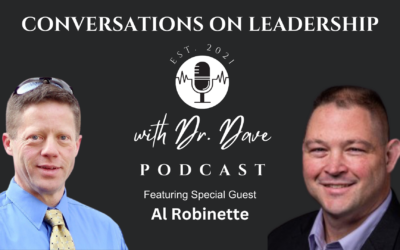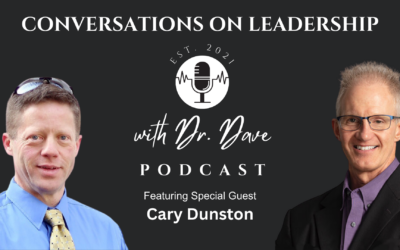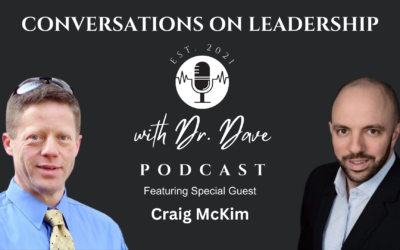Transcript
Dr. Dave Miles: Welcome to “Conversations on Leadership with Dr. Dave.” We are here with a special guest, Dr. William Attaway from Catalytic Leadership. Dr. Attaway, could you introduce yourself to our listeners and give them a little bit of your background?
Dr. William Attaway: Sure, Dave. Thanks for having me on today. It’s a joy to be with you. I have served in leadership for nearly three decades, most recently as the lead pastor of a church in Northern Virginia for the last 17-plus years. During my leadership journey, I’ve focused on learning as much as I can about leadership and investing that knowledge into other leaders. That’s why I started Catalytic Leadership, my company focused on developing and training leaders. I believe that when a leader gets better, everybody benefits.
Dr. Dave Miles: Absolutely. I always like to lead off with this question: What does leadership mean to you, and what does good leadership look like?
Dr. William Attaway: I’ll answer that with a story, Dave. When I went to college, I started as a pharmacy major. I quickly realized that wasn’t for me, but I learned that there are no wasted experiences. During that time, I was introduced to the concept of a catalyst, something that sparks or accelerates significant change. As I developed as a leader, I embraced what I call catalytic leadership—a leader who sparks or accelerates significant change or action that has a powerful impact. To me, leadership is influence, as John Maxwell puts it, and it’s about using that influence for the benefit of others, not oneself.
Dr. Dave Miles: If you had to paint a picture of good leadership, what would it look like to you?
Dr. William Attaway: Good leadership is about leading for the benefit of others. A good leader is focused on a vision or mission that benefits more than just themselves. They use their resources, whether financial or people resources, for the benefit of as many others as possible. In my journey of leading and coaching other leaders, I’ve developed a process with 12 keys that are the components of catalytic leadership. These keys are what I return to time and time again when teaching and leading.
Dr. Dave Miles: I have always been known to be a sucker, so I’ll take the bait. What are the 12 components of being a catalytic leader?
Dr. William Attaway: I’m glad you asked, Dave. These 12 keys are outlined in my new book, “Catalytic Leadership,” launching on January 25th. The first key is cultivating a teachable spirit. Leaders who know it all are not catalytic. A teachable spirit is non-negotiable for leadership. It’s about having a constant learning posture, being humble, and learning from everyone, even if sometimes it’s learning what not to do.
Dr. Dave Miles: I agree. There’s a lot to be said for knowing what not to do. What’s the next key?
Dr. William Attaway: The second key is discovering your wiring. We all have different strengths, talents, passions, and temperaments. Understanding how you are uniquely wired helps you lead others more effectively. The next step is learning how your team is wired and how to lead them well. This aligns with your work, Dave, in helping teams communicate effectively.
Dr. Dave Miles: Absolutely. Communication within the senior leadership team is crucial. What’s the third key?
Dr. William Attaway: The third key is actively pursuing intentional growth. Growth doesn’t just happen. You need to develop a plan for personal growth, including what books to read, conferences to attend, and podcasts to listen to. Intentionality is key.
Dr. Dave Miles: I like that. What’s next?
Dr. William Attaway: The fourth key is being boldly action-oriented. Leaders need to be proactive and forward-thinking, not just reactive. The fifth key is evaluating ruthlessly. Constantly evaluate what went right, what went wrong, and how to improve next time. The sixth key is being family-focused. Many leaders sacrifice their family on the altar of their career, which is a poor trade.
Dr. Dave Miles: Very true. What are the next keys?
Dr. William Attaway: The seventh key is aspiring for proper productivity. It’s about being effective, not just busy. The eighth key is building up people and teams. Invest in people and build a healthy, productive team. The ninth key is never stop leading change. Change is constant, and leaders need to be proactive in leading it.
Dr. Dave Miles: Excellent points. Let’s take a quick break and continue with the remaining keys when we return.
[Music]
Dr. Dave Miles: Welcome back to “Conversations on Leadership with Dr. Dave.” Dr. Attaway, can you recap the keys we’ve discussed so far and then continue with the remaining ones?
Dr. William Attaway: Sure, Dave. We’ve covered:
- Cultivating a teachable spirit.
- Discovering your wiring.
- Actively pursuing intentional growth.
- Being boldly action-oriented.
- Evaluating ruthlessly.
- Being family-focused.
- Aspiring for proper productivity.
- Building up people and teams.
- Never stop leading change.
The tenth key is prioritizing clear communication. Leaders communicate constantly, but it needs to be clear. People should walk away understanding exactly what you meant. The eleventh key is developing other leaders. It’s about giving away your leadership and influencing not just the person you’re leading, but all the people they will lead in the future. The twelfth and final key is leading yourself well. We are often the hardest person to lead, but if we don’t lead ourselves well, our leadership journey will be cut short.
Dr. Dave Miles: Leading yourself well is crucial. What do you think is the best way for leaders to improve their leadership skills?
Dr. William Attaway: The best way I’ve found is to have a coach. A coach helps you look forward, develop a plan, and provides accountability, focus, and encouragement. I’ve benefited greatly from having a coach myself, and that’s why I coach others. A coach helps you apply the information and turn it into actionable steps in your specific context.
Dr. Dave Miles: How do you merge the 12 keys of catalytic leadership with your coaching?
Dr. William Attaway: The book is the beginning of the conversation. Information alone doesn’t bring transformation; application does. In a coaching relationship, we identify the five primary areas where the leader wants to grow and focus on those. These areas often align with the 12 keys, setting the agenda for our coaching sessions and ensuring the leader makes progress.
Dr. Dave Miles: That’s a powerful approach. How can listeners connect with you and get your book?
Dr. William Attaway: Listeners can visit catalyticleadership.net to set up a discovery call or order the book. The book is also available on Amazon and other online retailers. My goal is to help leaders get better intentionally, and I’m ready to be on Team You.
Dr. Dave Miles: Excellent. As we approach the end of this segment, what’s one strategy leaders can implement in 2022 to improve their leadership?
Dr. William Attaway: Leaders should prioritize self-leadership. It’s easy to focus on external issues and put personal growth on the back burner, but neglecting self-leadership limits your capacity and influence. Intentional self-leadership ensures you’re at your best to lead others effectively.
Dr. Dave Miles: Great advice. We’re nearing the end of our time, so I want to thank you, Dr. Attaway, for being on “Conversations on Leadership.” For our listeners, remember to connect with Dr. Attaway at catalyticleadership.net. Thank you for joining us, and we’ll see you next time.
This week on Conversations on Leadership with Dr. Dave, our special guest is Dr. William Attaway.
Dr. William Attaway is an Executive Mindset and Leadership Coach, a pastor, an author, and a podcaster who helps high-performance entrepreneurs, agency owners, and their teams to conquer challenges & maximize potential with Clear-Minded Focus, Calm Control, & Confidence.
As the Founder of Catalytic Leadership LLC, and with nearly 30 years of experience leading and coaching leaders, he speaks, teaches, and writes on Catalytic Leadership and the Catalytic Mindset, serving clients all over the world through 1:1 and group coaching.
William’s work as an author includes his most recent Amazon best-selling book, Catalytic Leadership: 12 Keys to Becoming an Intentional Leader Who Makes a Difference (2022).
His first book, Lead: Leadership Lessons from the (Not So) Minor Prophets (2014) also achieved Amazon best seller rank.
Get a free copy of his latest book, “Catalytic Leadership” here: https://www.catalyticleadership.net/free-catalytic-leadership-book-5439
You can connect with William on LinkedIn at https://www.linkedin.com/in/williamattaway/ and on his site, https://catalyticleadership.net/.
Let us know your insights from the podcast in the comments!
Don’t forget to subscribe and hit the notification bell to get notified of each week’s podcast that drops on Mondays at 0800 Eastern.



